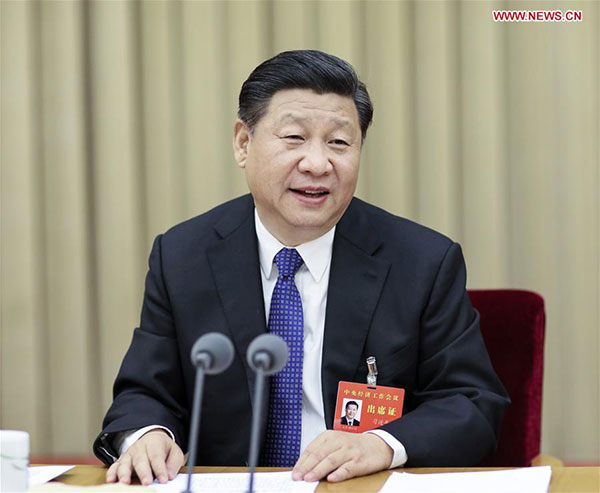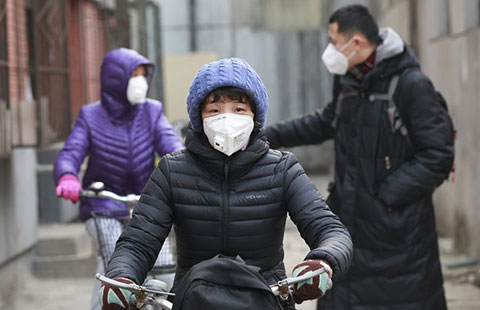China seeks to make cities better places to live in
Updated: 2015-12-22 22:18
(Xinhua)
|
||||||||
|
 |
|
Chinese President Xi Jinping, also general secretary of the Communist Party of China (CPC) Central Committee and chairman of the Central Military Commission, speaks at the Central Urban Work Conference in Beijing, capital of China. The conference was held in Beijing from Dec 20 to Dec 21. [Photo/Xinhua] |
BEIJING - China has detailed its urban planning vision, which has been designed to make its sprawling cities more inclusive, safer and better places to live.
In a statement released after the Central Urban Work Conference, which ran from Dec. 20 to Dec. 21 and was attended by President Xi Jinping and Premier Li Keqiang, policymakers pledged to transform urban development patterns and improve city management.
The last time China held such a high-level meeting was in 1978, when only 18 percent of the population lived in cities. By the end of 2011, in excess of 50 percent of the population called the city their home.
While the "triumph of the city," which characterized the past decades, has brought about significant social and economic changes in China, it has also spawned problems such as traffic jams, air and water pollution and a stretched public safety network.
On Tuesday, 40 cities in north China had issued alerts for air pollution. Beijing, together with the cities of Baoding, Handan, Langfang and Xingtai in the neighboring province of Hebei, had issued red alerts, the most serious level of the four-tier warning system.
Such urban ills have provoked the ire of the public, putting pressure on city planners to find workable solutions.
The Central Urban Work Conference said livable cities should be the central goal of China's urban planning, and urban development should be focused on creating environments where people can live in harmony with each other and nature.
The government will take a more sophisticated approach to its urban planning, and encourage enterprises and citizens to participate in creating the cities of the future, according to the statement.
Safety first
Tuesday's statement said safety would be the top priority in city development and management.
"Safety should underpin every aspect of urban work," the statement said.
The emphasis comes in the wake of fatal accidents that have sent shockwaves through city planning departments all over the country.
A landslide hit an industrial park in Shenzhen on Sunday after a huge pile of construction waste collapsed and flowed down a hill, killing one and leaving 76 people missing.
On Aug. 12, two explosions ripped through a warehouse storing hazardous chemicals and residences nearby at Tianjin Port. The blast claimed 173 lives, including 104 firefighters.
Teng Wuxiao, director of Fudan University public safety research center, said there was a lack of systems in place to assess risks.
"In China, the government can deal with the aftermath very well, but more must be done to detect risks and prevent accidents," he noted.
Integrating rural migrants
China's urbanization drive will integrate rural residents into cities by granting migrant workers household registration, as long as they have lived and worked steadily there for a set period of time, said Tuesday's statement.
While nearly 55 percent of the population live in cities, less than 40 percent are registered urban residents. Many migrant workers are denied "hukou" (official residence status), which means they are not entitled to equal education, employment rights and social security services.
China plans to raise the number of registered urban residents to around 45 percent by 2020.
City planning
The size of a city shall not exceed the available resources and environment, Tuesday's statement said.
Currently, Beijing, Shanghai and Chongqing municipalities all have populations exceeding 20 million. Cities like Tianjin, Guangzhou and Shenzhen each have more than 10 million.
The statement said China will control city development in a bid to address aimless expansion.
More will be done to upgrade city clusters in the eastern region, such as encouraging migration to central and western regions, according to the statement.
China will also "largely complete" the ongoing renovation of urban substandard housing, underdeveloped areas in cities, and dilapidated housing by 2020.

 Whatever the shape or size of a tree, Merry Christmas!
Whatever the shape or size of a tree, Merry Christmas!
 The world in photos: Dec 14 - 20
The world in photos: Dec 14 - 20
 First American woman who works as captain for a Chinese airline
First American woman who works as captain for a Chinese airline
 Life of a family amid Beijing's red alert smog
Life of a family amid Beijing's red alert smog
 External coffin lid of 2,000-year-old Chinese tomb opened
External coffin lid of 2,000-year-old Chinese tomb opened
 First Miss Iraq named in decades
First Miss Iraq named in decades
 Iraq holds its first beauty contest in 40 years
Iraq holds its first beauty contest in 40 years
 Highlights at the Light of the Internet Expo
Highlights at the Light of the Internet Expo
Most Viewed
Editor's Picks

|

|

|

|

|

|
Today's Top News
Shooting rampage at US social services agency leaves 14 dead
Chinese bargain hunters are changing the retail game
Chinese president arrives in Turkey for G20 summit
Islamic State claims responsibility for Paris attacks
Obama, Netanyahu at White House seek to mend US-Israel ties
China, not Canada, is top US trade partner
Tu first Chinese to win Nobel Prize in Medicine
Huntsman says Sino-US relationship needs common goals
US Weekly

|

|







